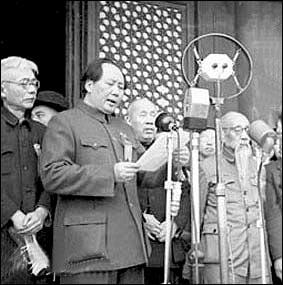21 September 2009

IN A FEW DAYS, it will be 60 years since the Communist Party of China (CPC), led by Mao Zedong, established the People's Republic of China. After a civil war that had lasted 22 years and was only interrupted so both sides could fight as allies in another war (against Japan, from 1937-1945) -talk about a devil's pact- the CPC came out as victor.
On October 1, 1949, in a grand ceremony at Tiananmen Square, witnessed by 300,000 people, chairman Mao solemnly proclaimed the People's Republic of China. (reading from a Letter sized crib, so as not to forget to mention all the people without whom the People's Republic would not have been possible)
But just as many modern day Republicans, Mao struggled with the discrepancies between Utopia and Reality. His Utopia was the communist society, purged of all "liberal bourgeois elements" (meaning capitalism). But he also wanted a modern society, wealthy, powerful and internationally respected. This, of course, is remarkably similar to Republicans who want health care companies to provide better, cheaper care for everybody, without being regulated at all, just out of the goodness of their capitalist hearts. (meaning where the lion lies with the lamb and all that)
Like so many dictators before him, Mao meant well but could never quite accept that Reality always has some demands of its own.
Take the Great Leap Forward, which he launched in 1958. The idea behind it -rapidly transforming the country from an agrarian society to a modern, industrialized nation- was a noble one. But the program proved to be too big a success for its own good, as hinted at by its aka name, Great Chinese Famine ( and the fact that 36 million Chinese starved to death). Just as the 47 million uninsured Americans are -in some ways- a monument to the success of capitalism. Because there is a reason why those people are uninsured or left untreated, namely their cost would outweigh the yield. They might be sick already, have a higher risk of becoming sick, or can't afford insurance. To insure such people would be a losing proposition. (and that's not what this country is build on)
A few years after the disaster of the Great Leap, Mao started the Cultural Revolution (1966-1976). Trying to uproot the evil tree of Capitalism once and for all through post-revolutionary class struggle. Much like there are those in today's world who will do anything to put that capitalist tree back on its exact same spot again, even though the storm of 2008 showed some of its roots have long been dead.
To some, a good old fashioned ideology is worth millions. Stalin's Soviet Union, Pol Pot's Cambodia, Mao's China. Millions died or were ousted from their jobs, humiliated, re-educated and imprisoned. But under Mao's successor, Deng Xiaoping, China quickly learned the key lesson to survival and success: always remain flexible and adaptable, instead of becoming dogmatic and rigid.
Amazingly enough (considering the US was already the richest country in the world when the Chinese were still painting their Little Red Book) the challenges the US and China face in the coming decade(s) will be largely the same: getting the people better health care, education, environmental protection and other social services. Seems the US needs Barack Obama to be its own, home grown Deng Xiaoping, teaching it to become flexible again, and adapt to the challenges of today and tomorrow.
